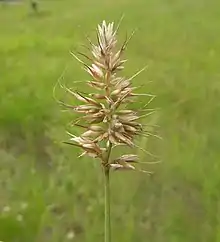Echinopogon caespitosus
Echinopogon caespitosus, the bushy hedgehog grass or tufted hedgehog grass, is a species of grass native to southeastern Australia. It is often found in disturbed areas. The original specimen was collected at Katoomba railway station in 1931, and published in Icones Plantarum in 1934 by Charles Hubbard. The grass may grow to 1.5 metres, and is noticeable due to its dense, bristly head. The specific epithet is derived from Latin, meaning tufted.[1][2]
| Echinopogon caespitosus | |
|---|---|
 | |
| Scientific classification | |
| Kingdom: | Plantae |
| Clade: | Tracheophytes |
| Clade: | Angiosperms |
| Clade: | Monocots |
| Clade: | Commelinids |
| Order: | Poales |
| Family: | Poaceae |
| Subfamily: | Pooideae |
| Genus: | Echinopogon |
| Species: | E. caespitosus |
| Binomial name | |
| Echinopogon caespitosus | |
Two varieties are currently recognised:
- Echinopogon caespitosus var. caespitosus
- Echinopogon caespitosus var. cunninghamii
References
- "Echinopogon caespitosus". PlantNET - NSW Flora Online. Retrieved November 1, 2018.
- Les Robinson - Field Guide to the Native Plants of Sydney, ISBN 978-0-7318-1211-0 page 270
This article is issued from Wikipedia. The text is licensed under Creative Commons - Attribution - Sharealike. Additional terms may apply for the media files.